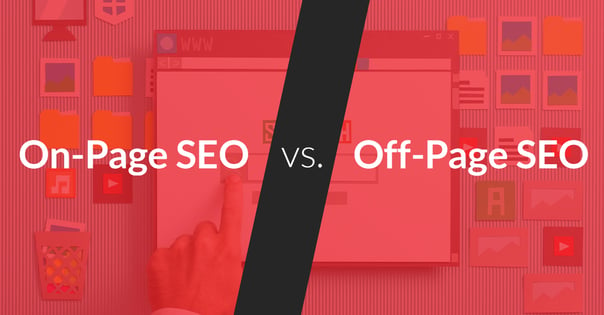On-Page SEO vs. Off-Page SEO: What’s the Difference?
Google has made many significant changes to their search engine algorithms. Unfortunately, this means that as an SEO marketer, you will not use the same techniques as you did five years ago to get the results that you want. Today’s algorithms have applied more emphasis on optimizing user pages and not just the search engine crawlers.
Another problem is that marketers approach SEO as a singularity rather than a unit with many aspects that all need individual attention. There are two distinct elements that all marketers need to focus on; On-Page SEO and Off-Page SEO. There is a significant difference between the two that all marketers should understand.
On-Page SEO
On-Page SEO encompasses all the measures that can be taken directly within a website to improve its search engine ranking. The foundation of On-Page SEO revolves around the most basic search engine optimization tactics, such as optimizing Meta descriptions, HTML code, title tags, alt tags and, of course, using keywords in your content. On-page SEO will also pay attention to considerations such as content quality, page performance, and content structure. Critical factors of On-Page SEO are:
- Keywords- Keywords will always be relevant to optimization. However, today, the focus has shifted to long-tail keywords because they fit the search patterns of today’s internet users.
- Meta Description- This is a short description that appears below a URL on a search engine results page. On-page SEO demands that you keep it below 300 characters, so that it appears in full.
Off-Page SEO
Off-Page SEO, on the other hand, encompasses the page ranking activities that occur off your website, such as backlinks from another website. It also revolves around promotional methods you use to market your website, such as how much exposure your site gets on social media. Off-Page SEO factors include:
- Backlinks- The amount and quality of backlinks you have on your website is one of the most significant elements of off-page SEO. If you have more sites linking to your content, Google will grant you more domain authority, which will, in turn, boost your ranking.
- Social Promotion- Page ranking is not directly tied to interactions on social media posts. However, social media posts that get a lot of clicks will boost traffic to the website. Moreover, any content that is shared on Google+ will be indexed and help boost rankings.
- Domain Authority- Domain authorities are measured on a scale from 1 to 100; yours is given a number to determine the strength of the website. Websites with a higher domain authority receive preferential treatment in search results. Sites with a lower grade will rank near the bottom.
Can One Be Without the Other?
On-page and off-page SEO work together to improve search engine rankings. They complement each other, and for professional marketers, one cannot exist without the other. On-page SEO is like building a foundation for a house. Off-page SEO is the maintenance you conduct on the foundation to ensure it remains intact. Therefore, it would be best if you use them both.
Thrive Online With Precision
Precision Creative provides a number of services to ensure that your on and off-page SEO efforts are performing with Precision. Contact us to discuss how we can take your online presence to the next level.
